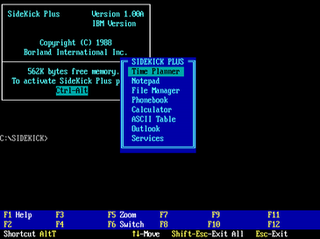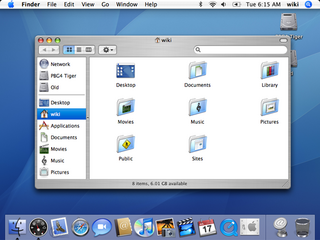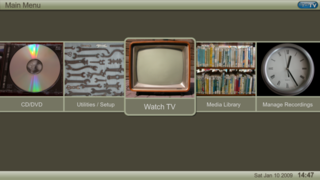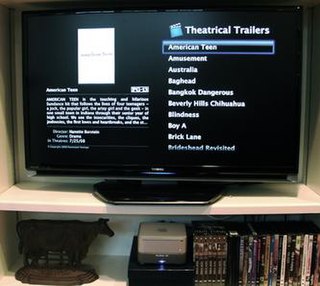
Microsoft Office, or simply Office, is a family of client software, server software, and services developed by Microsoft. It was first announced by Bill Gates on August 1, 1988, at COMDEX in Las Vegas. Initially a marketing term for an office suite, the first version of Office contained Microsoft Word, Microsoft Excel, and Microsoft PowerPoint. Over the years, Office applications have grown substantially closer with shared features such as a common spell checker, OLE data integration and Visual Basic for Applications scripting language. Microsoft also positions Office as a development platform for line-of-business software under the Office Business Applications brand. On July 10, 2012, Softpedia reported that Office was being used by over a billion people worldwide.

GNOME Evolution is the official personal information manager for GNOME. It has been an official part of GNOME since Evolution 2.0 was included with the GNOME 2.8 release in September 2004. It combines e-mail, address book, calendar, task list and note-taking features. Its user interface and functionality is similar to Microsoft Outlook. Evolution is free software licensed under the terms of the GNU Lesser General Public License (LGPL).

Microsoft Outlook is a personal information manager from Microsoft, available as a part of the Microsoft Office suite. Though primarily an email client, Outlook also includes such functions as calendaring, task managing, contact managing, note-taking, journal logging, and web browsing.

Borland Sidekick was a personal information manager (PIM) launched by American software company Borland in 1984 under Philippe Kahn's leadership. It was an early and popular terminate and stay resident program (TSR) for MS-DOS which enabled computer users to activate the program using a hot key combination while working in other programs. Although a text-mode program, Sidekick's window-based interface echoed that of the Apple Macintosh and anticipated the eventual look of Microsoft Windows 2.0. It included a personal calendar, text editor, calculator, ASCII chart, address book, and phone dialer. According to the prospectus for Borland's initial public offering of stock to the public, Sidekick sold more than 1 million copies in its first three years.

Mac OS X Tiger is the fifth major release of Mac OS X, Apple's desktop and server operating system for Mac computers. Tiger was released to the public on April 29, 2005 for US$129.95 as the successor to Mac OS X 10.3 Panther. Some of the new features included a fast searching system called Spotlight, a new version of the Safari web browser, Dashboard, a new 'Unified' theme, and improved support for 64-bit addressing on Power Mac G5s. Mac OS X 10.4 Tiger offered a number of features, such as fast file searching and improved graphics processing, that Microsoft had spent several years struggling to add to Windows with acceptable performance.

Kodi is a free and open-source media player software application developed by the XBMC Foundation, a non-profit technology consortium. Kodi is available for multiple operating systems and hardware platforms, with a software 10-foot user interface for use with televisions and remote controls. It allows users to play and view most streaming media, such as videos, music, podcasts, and videos from the Internet, as well as all common digital media files from local and network storage media.

MythTV is a free and open-source home entertainment application with a simplified "10-foot user interface" design for the living room TV. It turns a computer with the necessary hardware into a network streaming digital video recorder, a digital multimedia home entertainment system, or home theater personal computer. It can be considered a free and open-source alternative to TiVo or Windows Media Center. It runs on various operating systems, primarily Linux, macOS, and FreeBSD.

A home theater PC (HTPC) or media center computer is a convergent device that combines some or all the capabilities of a personal computer with a software application that supports video, photo, audio playback, and sometimes video recording functionality. In recent years, other types of consumer electronics, including game consoles and dedicated media devices, have crossed over to manage video and music content. The term "media center" also refers to specialized application software designed to run on standard personal computers.

Microsoft Project is a project management software product, developed and sold by Microsoft. It is designed to assist a project manager in developing a schedule, assigning resources to tasks, tracking progress, managing the budget, and analyzing workloads.

Windows Live is a discontinued brand-name for a set of web services and software products from Microsoft as part of its software plus services platform. Chief components under the brand name included web services, several computer programs that interact with the services, and specialized web services for mobile devices.
MobileMe is a discontinued subscription-based collection of online services and software offered by Apple Inc. All services were gradually transitioned to and eventually replaced by the free iCloud, and MobileMe ceased on June 30, 2012, with transfers to iCloud being available until July 31, 2012, or data being available for download until that date, when the site finally closed completely. On that date all data was deleted, and email addresses of accounts not transferred to iCloud were marked as unused.

GroupWise is a messaging and collaboration platform from Micro Focus that supports email, calendaring, personal information management, instant messaging, and document management. The GroupWise platform consists of desktop client software, which is available for Windows, Mac OS X, and Linux, and the server software, which is supported on Windows Server and Linux.
An app store is a type of digital distribution platform for computer software called applications, often in a mobile context. Apps provide a specific set of functions which, by definition, do not include the running of the computer itself. Complex software designed for use on a personal computer, for example, may have a related app designed for use on a mobile device. Today apps are normally designed to run on a specific operating system—such as the contemporary iOS, macOS, Windows or Android—but in the past mobile carriers had their own portals for apps and related media content.
Microsoft Mobile Services are a set of proprietary mobile services created specifically for mobile devices, they are typically offered through mobile applications and mobile browser for Windows Phone, Android, iOS, BlackBerry, Nokia platforms, BREW, and Java ME. Microsoft's mobile services are typically connected with a Microsoft account and often come preinstalled on Microsoft's own mobile operating systems while they are offered via various means for other platforms. Microsoft started to develop for mobile computing platforms with the launch of Windows CE in 1996 and later added Microsoft's Pocket Office suite to their Handheld PC line of PDAs in April 2000. From December 2014 to June 2015, Microsoft made a number of corporate acquisitions, buying several of the top applications listed in Google Play and the App Store including Acompli, Sunrise Calendar, Datazen, Wunderlist, Echo Notification Lockscreen, and MileIQ.

elementary OS is a Linux distribution based on Ubuntu LTS. It promotes itself as a “fast, open, and privacy-respecting” replacement to macOS and Windows and has a pay-what-you-want model. The operating system, the desktop environment, and accompanying applications are developed and maintained by Elementary, Inc.











